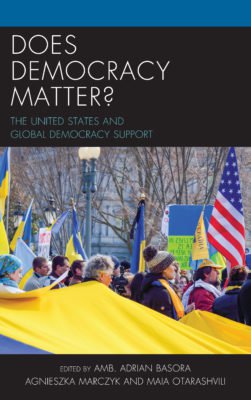What Should Be The Role Of Democracy Promotion In American Foreign Policy? – Review
By Published by the Foreign Policy Research Institute
By Cornell Overfield*
(FPRI) — On June 19, the Foreign Policy Research Institute (FPRI) hosted a BookTalk on Does Democracy Matter?, a recently published collection of essays edited by Adrian Basora, Agnieszka Marczyk, and Maia Otarashvili. The panel featured Ambassador Basora and Nikolas Gvosdev, a contributor to the volume and FPRI Senior Fellow, with Ms. Otarashvili, the Program Manager of the Eurasia Program, moderating. Gvosdev’s brief reflections on the event and its relevance to the morality of restraint can be found here.
Both Ambassador Basora and Mr. Gvosdev quickly answered the book title’s question with a decisive and emphatic yes. Despite popular fatigue with democracy and an autocratic offensive against the Western model, liberal democracies remain America’s natural strategic partners and improve the U.S. position in the world. Furthermore, although the democratic recession and domestic challenges may tempt the United States to turn inward or simply receive the world as it is, policymakers and diplomats should instead retain democracy promotion as a, not the, central tenet of U.S. foreign policy. However, both panelists rejected the dominant policies of the past 20 years, which prescribe a kind of “one size fits all” democracy-promotion program for all autocracies and developing democracies, and they instead proposed a “triage” approach.

Triage requires differentiating between states that have fertile ground for developing the norms and institutions required for a liberal democracy, and those which don’t (both speakers were careful to denounce cultural determinacy—the idea that it is impossible for certain cultures to achieve democracy), or those where short-term U.S. strategic interests run against democratization. U.S. programs should be scrapped in those countries where near-term prospects are dim, and the State Department should focus its limited time and money on crafting case-by-case programs in those countries that promise the best return on investment.
While both panelists agreed on the need for changes in democracy promotion policies, their respective chapters in Does Democracy Matter? reveal a subtle difference in why these changes are necessary. In the conclusion, Ambassador Basora and his co-author, Kenneth Yalowitz, emphasize the effect that recent developments—particularly the Iraq War, the 2008 financial crisis, and the autocratic onslaught—have had on the prospects of democracy promotion. In his chapter surveying stances on democracy promotion from realpolitikers to idealists, Gvosdev gave passing attention to these developments, but focused instead on the inherent challenges of democracy promotion—scarce resources, the clash of competing interests and values, and the short-term instability produced by the democratization process (the J-curve, as he says). Whereas Ambassador Basora noted his desire to change policy in reaction to changed circumstances, Gvosdev implied that triage should be the natural state of American democracy promotion.
During to the panel, Gvosdev suggested that, in those countries deemed promising, the United States should offer technical assistance, guarantee peaceful transitions in power (where the outgoing leaders do not end up dead or in a prison cell), and make membership in desirable Western institutions conditional on clear progress towards democracy. Ambassador Basora echoed this last point when he recalled his conversations with Prime Minister Vladimír Mečiar of Slovakia in the early 1990s. At that time, he emphasized that membership in NATO was contingent on Slovakia adopting democracy. Ambassador Basora also suggested a tri-level system of triage, in which the United States promotes democracy in countries with fertile ground, defends fledgling democracies against authoritarian offensives, and cajoles competitive authoritarian states, in which authoritarianism is masked by the façade of elections, into making a gradual transition to real democracy. Democracy promotion itself also needs promotion—particularly to Americans who have grown weary of the costs of international engagement.
Finally, the United States should be clear and honest about the sometimes painful reforms which lie on the path of democratization. According to both speakers, much of today’s democracy fatigue, particularly in the former USSR, stems from the fact that local statesmen and American diplomats filled the heady days after 1991 with unattainable schedules for building democracy. All actors involved need to remember that democratization is a long and challenging process, which requires a generation of deliberate policies designed to change both attitudes and political and economic conditions.
Does Democracy Matter? is available for purchase on Amazon.
About the author:
*Cornell Overfield, an intern at FPRI for the summer of 2017, studies International Relations and History at the University of Pennsylvania.
Source:
This article was published by FPRI

